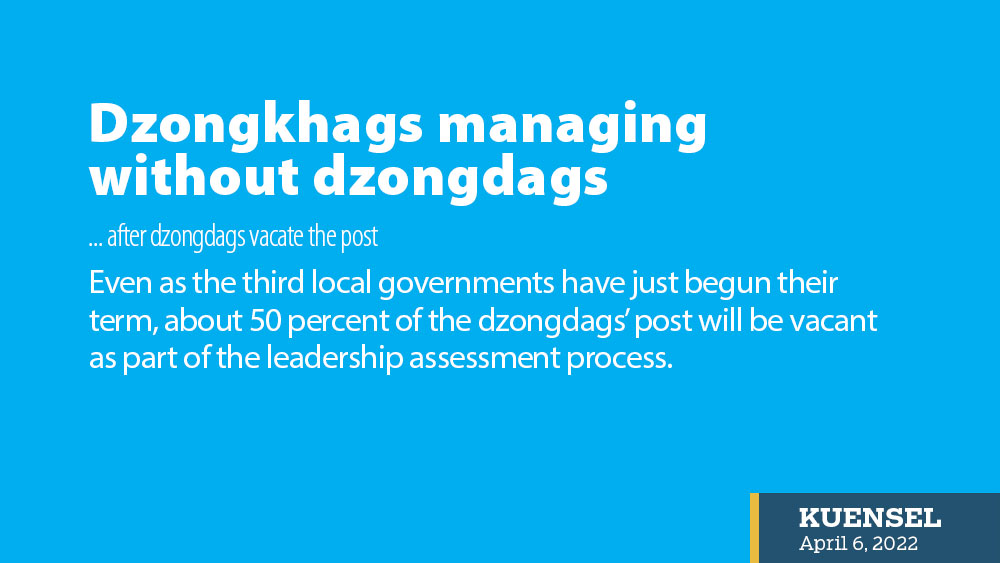… after dzongdags vacate the post
MB Subba
Even as the third local governments have just begun their term, about 50 percent of the dzongdags’ post will be vacant as part of the leadership assessment process.
The dzongdags were among the executives being managed out by the Royal Civil Service Commission (RCSC). The dzongdags, officials said, were preparing to leave the dzongkhags.
Some local leaders expressed concerns about the vacuum affecting the effective functioning of local governments.
Maedtsho Gup Gembo said that if the vacuum remains long, then it could hamper development activities and the annual performance agreements (APA) signed between the dzongdags and the gups.
A gup said that having a dzongdag to guide and advise local governments would matter although local governments had been empowered to plan and executive development activities within their jurisdictions.
“The leadership of the dzongdag to oversee and monitor development activities in the dzongkhag makes a difference,” he said.
According to the local government (LG) Act, the dzongdag shall be the chief executive officer of the dzongkhag and shall assist local governments in carrying out their functions.
The Act also empowers the dzongdag along with other officials who are also responsible for ensuring the effective and efficient management of the activities of the local government.
However, one of the dzongdags, who has been managed out, said that the dzongdags coordinate activities like meetings between the government and local governments. “We advise and provide support to the local government.”
Another dzongdag, who is managed out, said that it was an interim measure and that he believed that there was some plan in place to ensure that their absence would not affect local governments.
However, he said that the vacuum would not be felt much once officials officiate in their place. “Of course, there would always be a difference in having and not a dzongdag in a dzongkhag.”
The dzongdag is also the chairperson of the dzongkhag tendering committee. However, the dzongdags said that the responsibility could be taken over by one of the senior dzongkhag officials.
Some local leaders also said that they would not face many issues if the vacuum was for a short term.
Chaling Gup Tashi Dhendup said that the ongoing works would not be affected as they were being carried out by sector heads.
However, he added that if the gap prolongs, then the local government would face issues in terms of making important decisions and providing leadership. He reasoned that the dzongdag and the dzongrab are at different decision-making levels.
Some of the gups said that they were communicating with the dzongdags. A gup said that he had been told that the dzongrab would oversee the works in place of the dzongdag for the time being.
One of the dzongdags, who is leaving the civil service, said that he was content to leave as he had already served for many years.
“I’m leaving with motivation and prayers for the success of the future generation, which is more promising,” he said.
According to an RCSC press release, the transformation of the civil service would be driven by agencies that continuously innovate, use data and technology to deliver services, and work effectively and efficiently with one another more collaboratively.
“We will redesign public service delivery and reorganise our agencies such that the wellbeing of our citizens and our future generations are front and centre. The civil service will strive harder to deliver economic prosperity, progress and wellbeing for all,” it stated.


